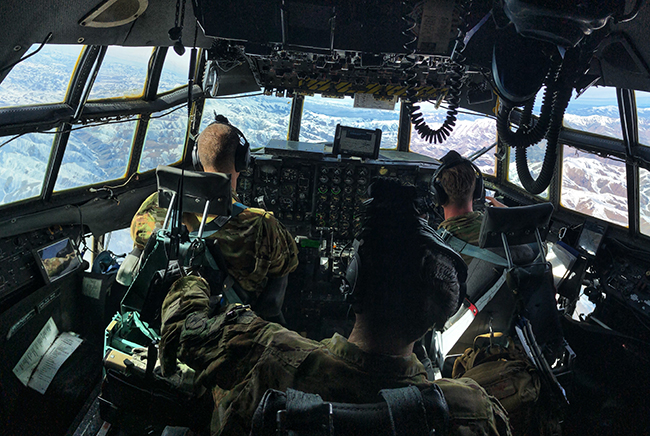
A US Air Force aircrew pilots an Afghan C-130 as part of the Train Advise and Assist Command's (TAAC-Air) mission on Dec. 19, 2018 in Kabul, Afghanistan. Air Force photo by SrA. Maygan Straight.
Ongoing support to Afghanistan was “high on the agenda” as NATO’s defense ministers, including the United States’ new acting Defense Secretary Mark Esper, gathered in Brussels for a ministerial meeting June 26-27.
“While many challenges remain in Afghanistan, we now have a unique opportunity for peace,” Secretary General Jens Stoltenberg said.
Stoltenberg acknowledged that “roughly half” of the troops participating in the Resolute Support mission there are from the US, saying the best way NATO can support the peace effort is to remain committed to the train, advise, and assist mission there. The Alliance has committed to financial support of Afghan Security Forces through 2024 and is preparing to send another rotation of troops to the country in the near future, he said.
“We will stay in Afghanistan for as long as necessary, to ensure the country never again becomes a safe haven for international terrorists,” Stoltenberg added.
The comments come days after two US soldiers were killed in combat operations in Afghanistan, prompting a rather heated exchange amongst democratic presidential hopefuls on June 26 about the merits of remaining in the country.
Army MSgt. Michael Riley, 32, who was assigned to the 2nd Battalion, 10th Special Forces Group (Airborne) at Fort Carson, Colo., and Sgt, James Johnston, 24, with the 79th Ordnance Battalion (Explosive Ordnance Disposal) at Fort Hood, Texas, were killed from small arms fire on June 25 while operating in the Uruzgan Province, according to a DOD release.
Ohio Congressman Tim Ryan, a member of the House Appropriations defense subcommittee, said during the first 2020 Democratic presidential primary debate, on June 26, that after 17 years in Congress, he’s learned “that you have to stay engaged in these situations. Nobody likes it. It’s long. It’s tedious. But right now, … I would say we must be engaged in this. We must have our State Department engaged. We must have our military engaged to the extent they need to be.”
Hawaii Congresswoman Tulsi Gabbard, a major in the Army Guard, shot back, saying that as a soldier herself, that “answer is unacceptable.”
“We have to bring our troops home from Afghanistan. We are in a place in Afghanistan where we have lost so many lives. We’ve spent so much money. Money that’s coming out of every one of our pockets, money that should be going into communities here at home, meeting the needs of the people here at home,” Gabbard said. “We are no better off in Afghanistan today than we were when this war began.”
Speaking June 27 during the second Democratic debate, former Vice President Joe Biden called withdrawal from Afghanistan “long overdue.”
“We should not have combat troops in Afghanistan. … It should end,” he said, adding: “You’re not going to find anybody who has pulled together more of our alliances to deal with what is the real stateless threat out there. We cannot go it alone in terms of dealing with terrorism.”
Esper told reporters en route to Brussels on June 25 he doesn’t expect any force size or structure changes in Afghanistan in the near future.
“I hope to travel to Afghanistan sometime soon to get a report. … I will be meeting with [Gen. Austin Miller, commander of US Forces in Afghanistan] in the next couple days, and so I’ll be able to get an update from him as well. It’ll be my first touchpoint with him in my new role, and I look forward to having that discussion with regard to what he sees, what he thinks it needs.”